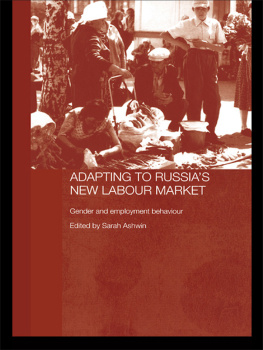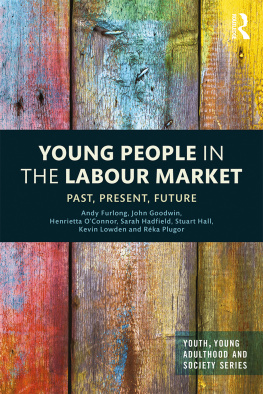Sarah Ashwin - Adapting to Russias New Labour Market: Gender and Employment Behaviour
Here you can read online Sarah Ashwin - Adapting to Russias New Labour Market: Gender and Employment Behaviour full text of the book (entire story) in english for free. Download pdf and epub, get meaning, cover and reviews about this ebook. year: 2006, publisher: Routledge, genre: Non-fiction. Description of the work, (preface) as well as reviews are available. Best literature library LitArk.com created for fans of good reading and offers a wide selection of genres:
Romance novel
Science fiction
Adventure
Detective
Science
History
Home and family
Prose
Art
Politics
Computer
Non-fiction
Religion
Business
Children
Humor
Choose a favorite category and find really read worthwhile books. Enjoy immersion in the world of imagination, feel the emotions of the characters or learn something new for yourself, make an fascinating discovery.
- Book:Adapting to Russias New Labour Market: Gender and Employment Behaviour
- Author:
- Publisher:Routledge
- Genre:
- Year:2006
- Rating:4 / 5
- Favourites:Add to favourites
- Your mark:
- 80
- 1
- 2
- 3
- 4
- 5
Adapting to Russias New Labour Market: Gender and Employment Behaviour: summary, description and annotation
We offer to read an annotation, description, summary or preface (depends on what the author of the book "Adapting to Russias New Labour Market: Gender and Employment Behaviour" wrote himself). If you haven't found the necessary information about the book — write in the comments, we will try to find it.
Sarah Ashwin: author's other books
Who wrote Adapting to Russias New Labour Market: Gender and Employment Behaviour? Find out the surname, the name of the author of the book and a list of all author's works by series.
Adapting to Russias New Labour Market: Gender and Employment Behaviour — read online for free the complete book (whole text) full work
Below is the text of the book, divided by pages. System saving the place of the last page read, allows you to conveniently read the book "Adapting to Russias New Labour Market: Gender and Employment Behaviour" online for free, without having to search again every time where you left off. Put a bookmark, and you can go to the page where you finished reading at any time.
Font size:
Interval:
Bookmark:
- Liberal Nationalism in Central Europe
Stefan Auer - Civil-Military Relations in Russia and Eastern Europe
David J.Betz - The Extreme Nationalist Threat in Russia
The growing influence of Western rightist ideas
Thomas Parland - Economic Development in Tatarstan
Global markets and a Russian region
Leo McCann - Adapting to Russias New Labour Market
Gender and employment behaviour
Edited by Sarah Ashwin - Building Democracy and Civil Society East of the Elbe
Essays in Honour of Edmund Mokrzycki
Edited by Sven Eliaeson - The Telengits of Southern Siberia
Landscape, Religion and Knowledge in Motion
Agnieszka Halemba

This edition published in the Taylor & Francis e-Library, 2005.
To purchase your own copy of this or any of Taylor & Francis or Routledges collection of thousands of eBooks please go to http://www.ebookstore.tandf.co.uk/.
ISBN13:9-78-0-415-34960-4 (Print Edition)

Font size:
Interval:
Bookmark:
Similar books «Adapting to Russias New Labour Market: Gender and Employment Behaviour»
Look at similar books to Adapting to Russias New Labour Market: Gender and Employment Behaviour. We have selected literature similar in name and meaning in the hope of providing readers with more options to find new, interesting, not yet read works.
Discussion, reviews of the book Adapting to Russias New Labour Market: Gender and Employment Behaviour and just readers' own opinions. Leave your comments, write what you think about the work, its meaning or the main characters. Specify what exactly you liked and what you didn't like, and why you think so.





